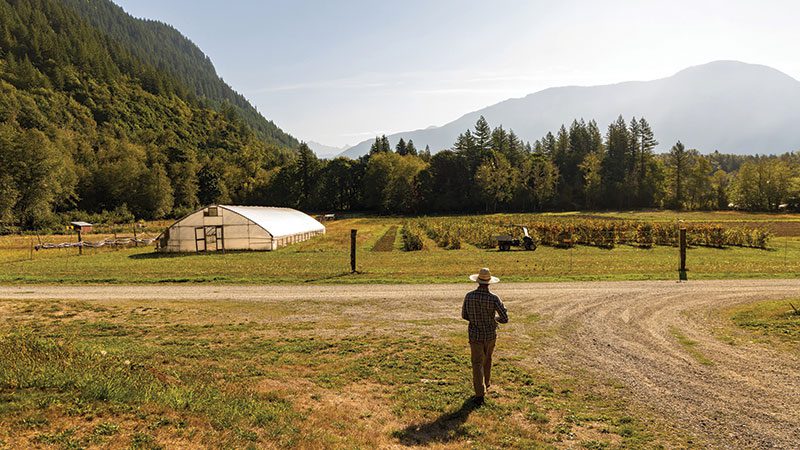An Organic Research Renaissance: Cascadian Farm’s New Chapter
By Rebekah Denn | photos by Meryl Schenker
This article was originally published in March 2024
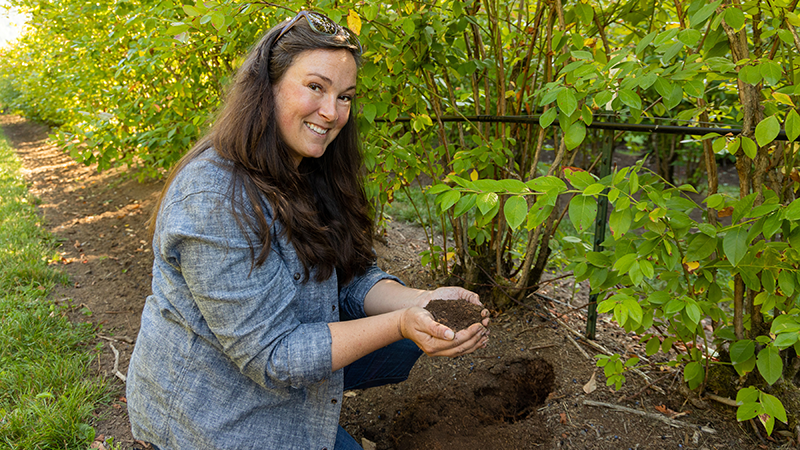
Ashley Minnerath, Community Relations Manager at the Rodale Institute Pacific Northwest Organic Center, shows the healthy soil below the farm’s blueberry bushes.
ROCKPORT, SKAGIT COUNTY–Whether they realize it or not, just about everyone who shops at U.S. grocery stores recognizes Cascadian Farm. The 90-acre property, anchored by a red farmstand and backed by snowy mountain peaks, helped jump-start the national organic foods movement when Gene Kahn began farming there in the early 1970s. For decades Cascadian was pictured on bagged frozen kale and blueberries, on jars of jams and boxes of cereal, long after the company grew so large it no longer sourced produce from its original Skagit fields.
The property is now entering a new life, one true to its original roots. Cascadian has become a research center for organic farming, meant to study what works best for farmers in this region—especially in an era of climate change and related challenges. The new Rodale Institute Pacific Northwest Organic Center will help conduct research, train and educate farmers, and demonstrate promising advances for organic farming in the Northwest.
The change began in late 2022, when General Mills, the corporation that bought the Cascadian Farm brand (then owned by Small Planet Foods) in 1999, donated the farm property to the Rodale Institute. Rodale, founded in 1947 in Pennsylvania as the Soil and Health Foundation, was a leading pioneer of the organic movement. It published groundbreaking books and launched influential magazines such as Prevention and Organic Gardening. Among many other endeavors, the institute oversees the 43-year-old Farming Systems Trial, the nation’s longest-running farming trial comparing conventional to organic farming. In recent years Rodale has expanded from its home campus to regional research centers around the U.S.; the Cascadian Farm property is its first foray into the Pacific Northwest.
“I’m overjoyed” at the farm’s new ownership, Kahn told Sound Consumer in an interview last year. “It’s a dream come true, it’s protected.”
Organic farming pioneers
For many years, the property had served mainly as a demonstration farm and tourist stop supporting organic farming and the Cascadian brand, featuring seasonal crops sold at the farmstand each summer and extra attractions like U-pick berries and ice cream made from Cascadian-grown fruit. The small staff maintained a healthy compost heap and showcased projects like a small plot of Kernza, a perennial grain being studied as a “climate-smart” crop by The Land Institute.
“You come here and you’re in awe of the beauty. It’s a perfect setting to engage with people in organic farming,” said Ashley Minnerath, who joined Cascadian as site director in 2014 and stayed on as community relations manager under Rodale. The iconic property was well-maintained by General Mills, but was an unclassifiable footnote in the portfolio of a multinational company overseeing 100+ brands from Betty Crocker to Yoplait.
“I think they came to a decision that “This farm has got so much potential…,” Minnerath said. As she understood it, they decided “it is not our expertise to manage a small organic farm operation, let’s find the next stewards of the land to really take over and help make it into what we know it can be.”
The Rodale Institute, “the grandfather of organic agriculture in this country,” was not on the list when Minnerath started researching potential successors. But realizing that the nonprofit had expanded far beyond its East Coast roots made it an obvious choice.
After decades in stasis, the farm’s now moving forward.
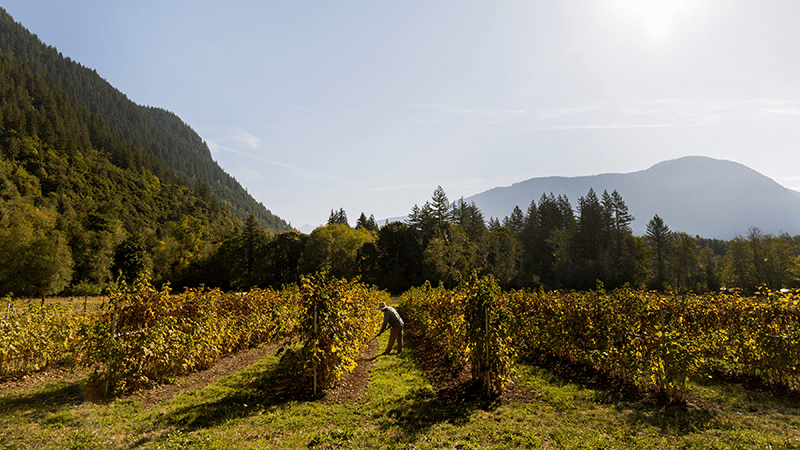
Farm manager Tim Colton at work at the historic farm.
A new beginning
The new owners began with a “listening session” last year hearing about opportunities and barriers to organic farming in the region. From that, they developed three goals:
- Conducting research trials focused on practices that help farmers adapt to a changing climate with increased heat, drought, and flooding, and weed and pest pressure.
- Supporting farmers through training and consulting aimed at improving yields, profitability, and soil health using organic and regenerative organic practices.
- Serving as a demonstration and education hub for farmers, agricultural professionals, and the public interested in organic and regenerative organic methods.
The endeavors are starting off with a small raspberry field research project aimed at managing weeds and nematodes. The farm’s U-Pick raspberry and blueberry fields should be open this summer, along with farm tours (see here for updates.)
Alongside it all, work continues to maintain the property as a productive, sustainable part of the ecosystem.
On one early fall day, Tim Colton, the property’s farm manager since 2018, headed into the fields to finish end-of-season tasks like removing a few rows of raspberries afflicted with root rot.
While the farm site is 90 acres, nestled in the Cascade foothills, its boundaries extend up the mountainside–only about a quarter of the property is farmable land, Minnerath said. (Portions of the rest are protected through the Skagit Land Trust, part of an arrangement Kahn made when he purchased the formerly-leased land from its previous owner.) Its lower fields are only around 200 feet above sea level, backed by Mount Cheval, pictured on Cascadian’s label for many years.
Rockport, where the farm was founded as New Cascadian Survival and Reclamation Project (see its origin story here), gets more than 80 inches of annual rain–more than double the rainfall in drier parts of Skagit County, such as tulip-heavy Mount Vernon.
Kahn remembered how surprised other farmers were in the ‘70s that he was even attempting to grow strawberries on land where they would be subject to sogginess that wasn’t an issue on the Western side. With help from those neighbors–and, ironically, with a boost from Rodale’s guidelines for organic farming, which was a little-known phenomenon then, they were ultimately able to harvest crops. Kahn worked in a cedar mill to keep the business afloat; “It was all built on volunteer labor and the cooperative community,” Kahn told Sound Consumer.
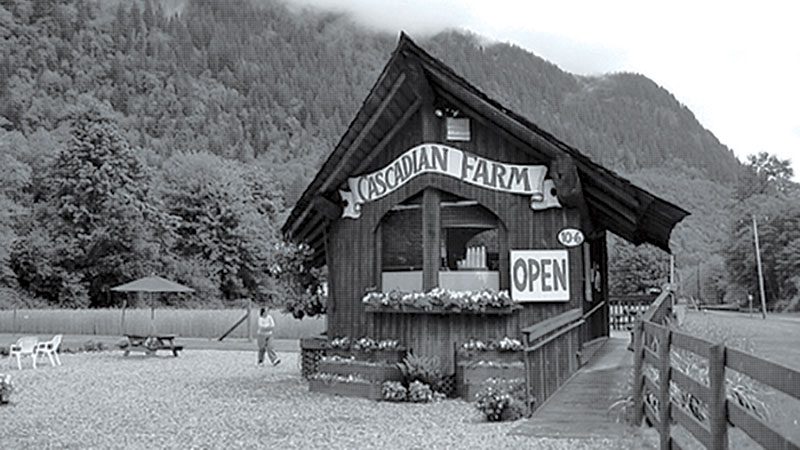
The original Cascadian Farm property in Rockport now houses the Rodale Institute Pacific Northwest Organic Center.
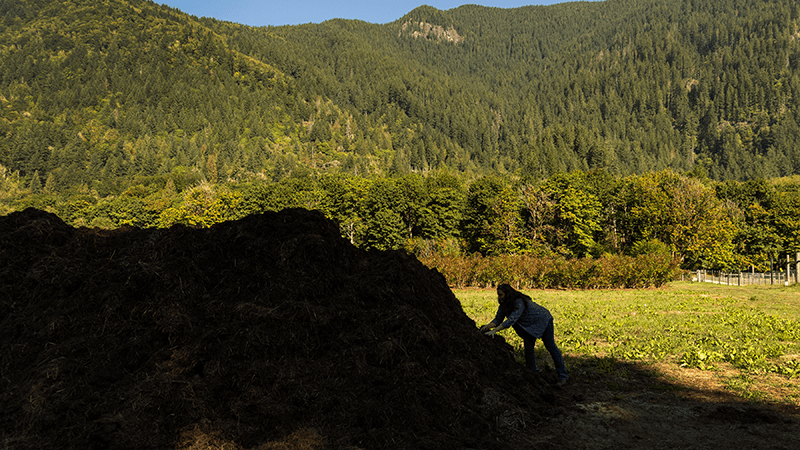
Carrots and zucchinis were among the first successes–edible though “ugly,” Kahn said–and PCC was the farm’s first buyer. “He often said ‘PCC subsidized my ignorance in agriculture,” Minnerath said.
Kahn advanced from simply selling produce to processing it, first enlisting Seattle’s Sunny Jim company to produce Cascadian Farm jams, and ultimately adding other processors and more than 100 other products from pickles to granola. Demand far outstripped what he could grow on the Cascadian land, and he enlisted other farmers who agreed to grow organic produce. It was still a tiny marketplace even a decade after Cascadian was founded–but it grew fast. And Kahn generally saw growth as something good. He helped develop Washington state’s organic standards, and later served on the National Organic Standards Board.
“It was a whole new paradigm in that time. He had to convince processors that they could process the foods,” Minnerath said. He once told her “The brand was always a means to an end”–creating more organic farmland and more organic farmers and more people eating organic foods.
“We still have two big rooms in the barn that we refer to as the carrot room and the potato room because that was where the carrots and potatoes were processed. I’ve heard stories that there was once a million pounds of potatoes in that barn,” Minnerath said.
Blueberries are still a crop at Cascadian–nearby organic apple farmers at Sauk Farm in Concrete bought some of the crop last year for an apple-blueberry baby food pouch now sold at PCC, for instance. The bushes are also an ongoing demonstration opportunity for sustainable farming.
We’re able to do that because we’re surrounded by this beautiful natural area. We don’t use any pesticides on the farm
The fungal disease mummy berry, for instance, commonly affects blueberries with a life cycle that plagues farmers. A shriveled “mummified” blueberry will fall to the ground from an affected plant and, when conditions are right in the spring, will sprout a small mushroom that releases spores attacking new plant growth. Farmers typically use fungicides to deal with the disease. Cascadian disrupts the cycle instead, watching for mushroom growth and regularly harrowing the soil. “We’re able to make a decent impact” on the fungus, Minnerath said, though one blueberry variety–Patriot, known for its large, sweet fruits–still usually takes a hit. Planting diverse other varieties along with Patriot helps blunt the impact of a bad mummy berry year as well as extending the farm’s berry season.
In a move that’s growing ever-rarer, the property relies on native bees to pollinate its crops rather than bringing in honeybees. “We’re able to do that because we’re surrounded by this beautiful natural area. We don’t use any pesticides on the farm,” Minnerath said.
It’s an education just to tour the property, with its mature trees, surprising small crops like hardy kiwis, cover crops like summer buckwheat. “It grows really fast. From seed to full growth is like 30 days,” Minnerath explained about the seed. “So it’s really good at shading out weeds because it can grow so fast and has a thick cover and the weeds can’t grow underneath that.”
Soil itself is a crop of sorts on the land; the farm relies entirely on its own compost.
“It’s all vegetarian compost. And so what grows best in the Northwest–grass and trees, right?” Minnerath said. At the beginning of the growing season each year the process begins with a few truckloads of sawdust from the local lumber mill. They add grass clippings from the farm each time the fields are mowed. By season’s end, it develops into a rich, crumbly mixture–“like chocolate cake,” as she put it, pulling out a handful from the warm pile… but smelling like the forest. “In one teaspoon of healthy soil there are over 9 million organisms…” she said. “It’s so important for organic farmers to feed the soil.” That makes for healthier plants that can combat pests and weeds, better water retention, better capturing of carbon.
It’s taken time to perfect farming techniques there for different fruits and vegetables, to experiment with new crops or new ideas and see what succeeds and fails. Unlike most growers, Rodale has that flexibility.
“A lot of things that you do in farming, you only do once or twice a season so you only have like 30 or 40 farming seasons to get it right,” Minnerath said. “And so it’s hard to take risks and do different things.”
As a nonprofit, Rodale’s regional neighbors can literally reap the benefits of its work. With the regional centers, the nonprofit can also now target its research toward their needs.
“Farming is so dynamic. It’s so different from farm to farm, and with all these different micro climates,” Minnerath said. “And so farmers in the Pacific Northwest need solutions that are different.”
It’s a new start, but built on the same founding philosophy.
“Our food choices matter, and what we purchase, and the farms and brands that we support matter,” Minnerath said. For shoppers, “supporting organic farms, getting to know their farmer and the practices that they’re using, and supporting this type of food system and regenerative organic food system helps to pave the way for an organic future. That’s what we’re working at in Rodale and what we’re trying to do–get the resources and knowledge to farmers to help them continue in their success and help to pave the way for an organic future.”
Learn more about Rodale
More information is online on the new Rodale Institute Pacific Northwest Organic Center.
The property will be open in the summer for tours and U-Pick berries; check the website for updates.
